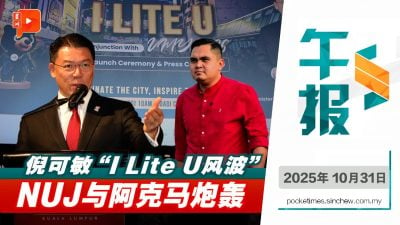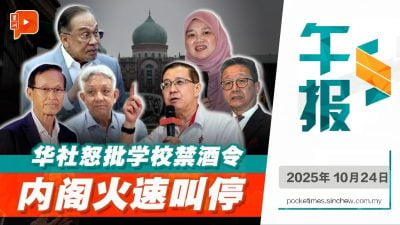
The controversy erupted when alcoholic drinks were served at the Global Travel Meet 2025 gala dinner. The biggest question was whether the dinner was organised by Tourism Malaysia. If it was actually a celebration dinner managed by the private sector, then politicians are merely stirring up unnecessary drama.
Tourism, Arts and Culture Minister Datuk Seri Tiong King Sing clarified that the dinner was not fully organised by his ministry, as claimed by critics, but rather proposed and managed by industry players themselves to help ease the financial burden of the government. The three major tourism associations also explained that the dinner was funded by the private sector — not by the ministry or Tourism Malaysia.
However, Deputy Prime Minister Datuk Seri Dr Ahmad Zahid Hamidi insisted that UMNO strongly objects to the serving of alcohol at any dinner organised by Tourism Malaysia, and said the matter would be raised in the Cabinet. UMNO Youth chief Datuk Dr. Mihammad Akmal Saleh further produced an invitation letter to “prove” the gala was indeed hosted by Tourism Malaysia, not by private organisers.
Over the two-and-a-half-day event, tourism packages worth RM420 million were sold. For industry players to take the initiative to host and lead the dinner — in appreciation of international partners — is understandable.
Therefore, this issue should not have become a major controversy if misunderstandings had been clarified. For instance, when an official event is outsourced to the private sector, clear procedures should be established — such as not using official letterheads or logos, not listing the event on official websites, and serving alcohol only after Muslim officials have left.
The Global Travel Meet organised by Malaysia for the first time gathered 600 international buyers, 100 media representatives, and 400 local industry players. Similarly, Melaka hosted the World Tourism Day and World Tourism Conference last month. These events generated significant foreign exchange for the country. Thus, when politicians criticise the serving of alcohol, they should also consider the need to entertain foreign guests and the broader interests for the nation. Politicising the issue only hurts Malaysia’s tourism industry.
This is not the first time politicians have used “alcohol” to stir public sentiment — such topics are emotionally charged and easy to exploit for political mileage. This time, Masjid Tanah member of parliament Datuk Wira Mas Ermieyati Samsudin from Parti Pribumi Bersatu Malaysia first raised the issue, followed by PAS information chief Ahmad Fadhli Shaari, who urged Prime Minister Datuk Seri Anwar Ibrahim to take stern action and dismiss the tourism minister, claiming it was necessary to restore public trust and uphold the sanctity of Islam as the official religion.
Competing with Perikatan Nasional (PN) for Malay votes, UMNO could not afford to lose the narrative. Akmal fired the first salvo against Tiong, followed by Zahid’s declaration that UMNO would defend religion.
The alcohol controversy thus exposed the anxiety of both the ruling and opposition parties over Malay voter support. Both sides see the alcohol issue as the quickest and most effective political weapon.
PAS, in particular, has mastered the tactic of linking alcohol with religion — from opposing beer festivals and protesting the whisky brand “Timah,” to condemning beer companies that raised fund for Chinese schools — all of which have strengthened its image as a defender of Islam. Repeated compromises and concessions by those in power have only emboldened PAS to push further.
In states governed by PAS, alcohol bans have already been enforced.
For example, in December last year, the Kota Bharu City Council and the Kelantan Islamic Affairs Department jointly prohibited the serving of alcohol in hotels — even at Chinese wedding banquets, effectively ending the tradition of “toasting” at weddings.
PAS’s relentless agitation has inflamed religious sentiment, influencing even government officials. In January, then-Ipoh mayor Datuk Rumaizi Baharin revealed that the city council had received requests from Muslim-majority areas to restrict alcohol sales. He said the council would need to study the situation in each locality before making any decision.
Meanwhile, several Chinese primary schools — including those in Telemong, Pahang and across Kelantan — reportedly received verbal directives from education officers prohibiting the serving of alcoholic drinks at events held in school halls.
PAS continues to occupy the moral high ground on alcohol and gambling bans, pressuring other parties to follow suit. Akmal, for example, supported the proposed alcohol ban by the Ipoh City Council, describing it as reasonable since it applied only in Muslim-majority areas — similar to measures earlier introduced in Manjoi, Perak.
Although PAS vowed at its September general assembly to win over non-Malay voters on its path to Putrajaya, the ideology and character of the party make it unlikely to move toward the middle path.
Unfortunately, politicians remain obsessed with religion, alcohol, gambling, and women’s dress codes — while turning a blind eye to corruption, economic stagnation, and foreign investment.
When everyone competes to appear more conservative, the nation stands still and spins in circles.
ADVERTISEMENT
ADVERTISEMENT








































